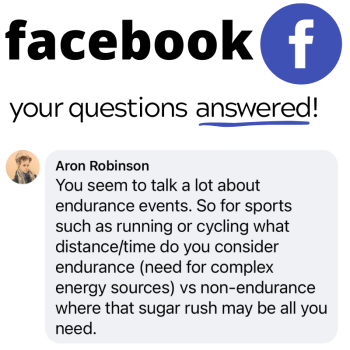Endurance Events

first, what do we consider an "endurance event"?
This is a great question because when many people hear the term endurance event or endurance sport, they think of a marathon, Ironman or similar events lasting several hours. While those certainly qualify, for the purposes of nutrition anything over 30 minutes would clearly be considered an endurance event. If you don’t agree, go try playing soccer or hockey for 30 minutes hard, it clearly requires endurance.
While the glycogen stored in your muscles and liver is typically more than enough to run, cycle or do pretty much anything else for an hour, you will still likely perform better if you take in a carbohydrate source that can be easily absorbed and used as fuel. And when you do, it’s not just the carbohydrates that are important. It’s also the water/hydration and electrolytes that you replenish at the same time. Your “during event” nutrition is about three things: hydration, energy and electrolytes. All three are important if you want to perform your best.
If it’s an event lasting 30 minutes or less, you can usually get away with taking in your nutrition immediately before the event. For example, a gel with water, or about 12 ounces of a high quality sports drink (we obviously recommend e-Gel or e-Fuel).
You may be asking: why immediately before and not a hour or two before? When you take in carbs long before the event you won’t need them at that moment, so your body will try to store them in your muscle glycogen stores. If you have carbo loaded before the event you’re glycogen stores will already be full so it will in part convert it into fat. When you take carbs immediately before your event your body will be able to start using that energy right away and rely less on converted energy from your glycogen stores. Your muscles burn glucose for energy, and complex carbohydrates are essentially a bunch of glucose molecules stuck together. In short, it’s a more readily available form of energy which will allow you to perform better.
Again, if you are skeptical, go out for a 30 minute run without taking anything. Then, on your next 30 minute run, take a gel with water just before you go and let us know how it goes. Spoiler alert, we already. know the answer.
In events lasting longer, complex carbs become even more important because of your body’s ability to uptake more energy as explained here.
second, when to use complex carbs vs sugars
In our opinion, the only time when a “sugar rush is all you need” as the Facebook question stated, is in a literal “sprint” event listing minutes at most. The problem is that a sugar high is very short lived and once your blood sugar drops, it drops below normal level. When that happens your body reduces insulin production as well. Insulin acts as a gatekeeper that allows glucose into your muscles for the energy conversion process. Thus, a drop in insulin production will further impact your performance.
In any event other than a true sprint, if you take in a carb source it should be primarily complex carbs. Your goal is to maintain energy levels without significant swings, and equally as important, maintain a consistent level of insulin production.
have a question?
When you leave a comment or question on any of our Facebook posts we will do our best to answer them. Some we will publish here on cranksports.com when we think lots of other people have the same question. Thank you to Aron Robinson for this question!

